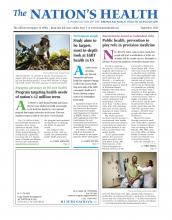Law can be the foundation for innovations in global public health, according to a new commission aimed at uniting the two disciplines.
The O’Neill Institute for National and Global Health Law at Georgetown University and The Lancet have partnered to form The Lancet-O’Neill Institute, Georgetown University Commission on Global Health and the Law. The commission, which will study the role of law in addressing global health issues, will release research on how international organizations and governments can use law for improving health and safety outcomes. The Lancet will publish studies written by the commission, which was announced in April.
Recent global health issues such as the Ebola outbreak compelled both The Lancet and the O’Neill Institute to investigate how laws can better prepare the international community to combat health threats, according to the institute.
“Ebola was a defining event in our generation for public health,” said Lawrence Gostin, JD, a professor at Georgetown University Law Center and co-chair of the commission. “We’ve got a convergence of health threats, the kind of which we’ve never faced. We have the epidemiological transition in many lower-middle income countries in infectious and non-communicable diseases and enormous security threats that we’ve never faced before.”
Public health issues such as supporting universal health coverage, ending tobacco use and fighting epidemics are all connected with law, Gostin said. The commission will look at ways laws, regulations and institutions can improve public health, according to an article published in the April 25 issue of The Lancet. The commission met for the first time at the Georgetown University Law Center in Washington, D.C., April 22-23.
Using an evidence-based approach in writing recommendations and studies is a particularly important goal for the commission. Evidence from research could convince governments to follow international rules set in treaties such as the World Health Organization’s 2005 Framework Convention on Tobacco Control, a set of guidelines for countries to combat tobacco, and the 2007 International Health Regulations, a legal instrument that requires signatories to report certain disease outbreaks and public health events, Gostin said. The commission would work to find incentives for governments to comply with international norms on global health.
Laws in numerous countries have affected public health. The United Kingdom’s salt-intake reduction program, which set voluntary targets for 85 categories of processed foods, contributed to reducing the salt intake of the population by 15 percent between 2004 and 2011 in England, according to a 2014 study from BMJ Open. A report in the January-March 2013 issue of the WHO South-East Asia Journal of Public Health said that reforms on the regulations of pharmaceuticals in Bhutan helped the country address a shortage of medicines from 2010 to 2011.
Creating laws to improve public health requires a commitment to following the law and strong legal institutions, Gostin said. The April meeting set the groundwork and expectations for the development of the commission. Capacity-building in regulations, enforcement and legislation are ways to develop rule of law and strong institutions, according to Gostin.
“It’s about introducing the rule of law,” he told The Nation’s Health. “The means for introducing it is about demonstrating the kinds of laws you need to make…strong institutions that are trustworthy, honest and accountable. Ordinary laws might not matter unless you have that.”
The commission plans on making public health recommendations for countries such as China, Gostin said. China is an example of a country enacting health reform despite a weak rule of law, he said. The Chinese government has recently introduced a variety of health reforms to achieve universal health care coverage; however, a lack of commitment to law and low public engagement in non-governmental organizations and institutions can make new regulations and reforms ineffective, according to a 2013 analysis published online in SpringerPlus. The study said the prevalence of bribing doctors for better health services widens the health gap between income groups in China.
International aid can affect the development of strong legal institutions. Foreign aid, such as for antiretroviral treatment for HIV or other medicines, can sometimes only provide temporary relief, Gostin said. Investments in technical assistance for developing institutions that support upholding and enforcing laws would provide more benefits in the long run, he said.
“It’s an exponentially better investment,” Gostin said. “Moreover, donors in the West do understand the idea of rule of law and justice. It really resonates with the values that donors might have.”
The commission realizes that encouraging governments to focus on public health and law can be difficult, but a such focus can lead to healthier populations, Gostin said.
“Would you rather have access to any doctor, hospital or medicine of the highest quality or would you rather never see a doctor again for the rest of your life?” Gostin said. “Everyone chooses public health when you explain it to them that way. What really makes people healthy is public health.”
For more information on the commission, visit http://www.law.georgetown.edu/oneillinstitute/research/LancetCommission.cfm.
- Copyright The Nation’s Health, American Public Health Association









